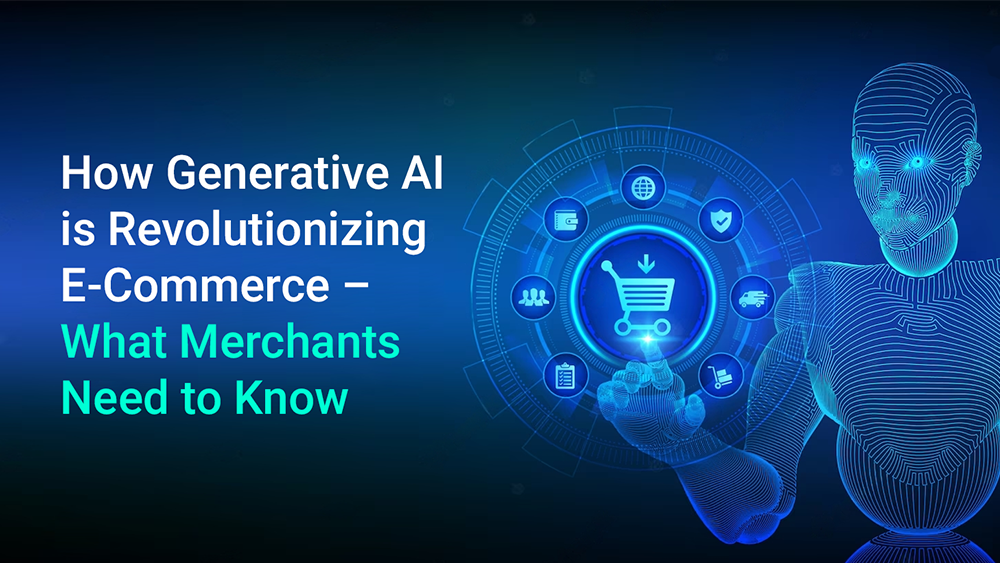During the pandemic, e-commerce was the epicenter of a strategic shift in how product-driven businesses engage, capture, and retain their consumer base. As e-commerce is set to continue to be at the forefront of many businesses’ digitalization strategies, an explosive overnight boom in progressive technologies that have abruptly materialized on the market—namely generative AI, is requiring organizations to aggressively seek ways to incorporate these powerful new technologies into their digitalization plans in order to stay ahead of the curve.
Generative AI’s overnight sensationalist explosion in both the media and mainstream narrative has seen this groundbreaking technology become the main focal point of discussion across the spectrum. Generative AI’s applications are seemingly endless and its potential promises to address major business challenges for those that are bold enough to harness and leverage its full potential.
Generative AI & E-Commerce
When it comes to e-commerce, generative AI can and is being deployed in a myriad of ways. Though the full extent of AI’s capabilities is yet to be discovered, organizations that are searching for ways to integrate AI’s prowess into their digital store experience could do so by putting it to use in different key operational areas to optimize and automate their online offering.
A primary way that generative AI is being utilized is to enhance the customer journey and experience. Generative AI can analyze customer browsing and purchase history to devise complimentary products and service recommendations that better match the customers’ interests and needs thereby creating a richer and more personalized customer shopping experience. Generative AI will further strengthen e-commerce shopping personalization through the deployment of intelligent virtual shopping assistants that will add another layer of value to the store’s experience.
One main part of the CX that is already being uniquely personalized through generative AI is the checkout process. This segment of the customer journey can be tailored by AI to include special promotions, payment methods, and exclusive shipping rates to create an individualized purchasing encounter that correlates with the customers’ purchase preferences.
E-commerce merchants should first seek to apply generative AI in this area as providing customers with an augmented customer experience has been proven to increase conversion rates and boost customer retention leading to increased revenue for e-commerce businesses.
Another key benefit of generative AI is its ability to automate manually-intensive day-to-day tasks such as writing optimized product descriptions, generating product images and ads, as well as optimized marketing and sales campaign content including automated reward campaigns based on purchase history and cumulative lifetime spend. These automations are key to freeing up manpower resources from repetitive mundane tasks and by leveraging generative AI in this regard, e-commerce companies can improve the effectiveness of their sales and marketing efforts as well as improve the visibility of their products and services and consequently drive sales volumes.
Aside from automating manually intensive processes, generative AI can also be used to automatically safeguard brands from cyberattacks. AI simplifies and automates fraud protection by canceling or flagging high-risk orders for review. Using generative AI to beef up protection protocols mitigates the risk of inventory being lost as well as provides an extra level of security that allows merchants to allocate manpower resources elsewhere.
Simultaneously, e-commerce can leverage generative AI to optimize their supply chain operations leading to reduced waste, lower costs, and improved supply chain efficiency. The AI’s data processing capabilities can dissect millions of different data points across the entire supply chain operations to generate insights and process improvement recommendations that humans would have difficulty spotting or that would have been impossible to identify. This could include everything from inventory management, demand forecasting, and planning, returns management, as well as logistics route optimization.
These data-driven decisions also lay the groundwork for comprehensive insights that can then be applied to different areas of the supply chain including the product development phase. Generative AI can then be utilized to design products that are more optimized and incorporate recyclable materials. Furthermore, the AI-generated insights could also be distributed and beneficial to business and customer focus groups in helping them to identify key strategic trends that will enhance the supply chain’s and business services and products.
Over the next few years, the rapidly escalating adoption of AI-integrated solutions across numerous business sectors will exponentially fuel AI market demand. Though the full extent of generative AI’s potential has yet to be fully explored, as with other au courant technologies such as blockchain, those that are early adopters tend to be the ones that ultimately reap the most rewards. The potential benefits that AI can bring to the e-commerce and supply chain industries are too significant to ignore and to stay ahead of the competition, e-commerce businesses should leverage this powerful technology and exploit it to its full potential.
About The Author
 Josh Tsui is the CEO of Floship, a leading global circular supply chain ecosystem solutions provider. Floship’s global circular supply chain ecosystem solutions cover all aspects of the global supply chain, ensuring minimal operation effort for e-commerce businesses while exceeding their expectations, allowing business owners to concentrate on driving growth and investment flexibility while gaining peace of mind.
Josh Tsui is the CEO of Floship, a leading global circular supply chain ecosystem solutions provider. Floship’s global circular supply chain ecosystem solutions cover all aspects of the global supply chain, ensuring minimal operation effort for e-commerce businesses while exceeding their expectations, allowing business owners to concentrate on driving growth and investment flexibility while gaining peace of mind.
For more information, click here.

Ready To Upgrade Your Logistic Solution?
Speak to Floship ecommerce logistic consultant about improving your global support chain today




